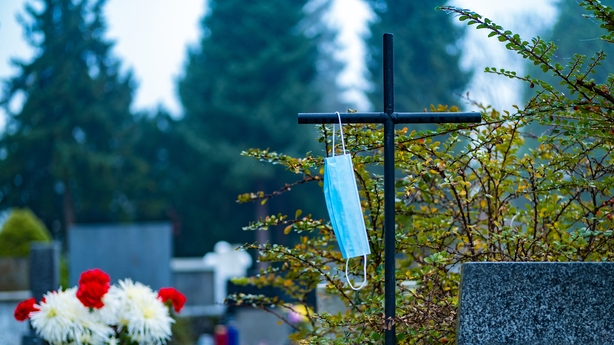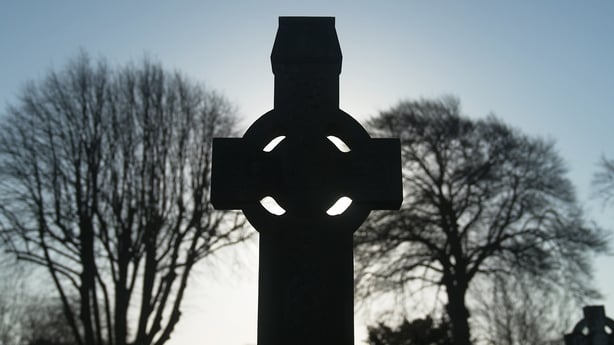The director of one Dublin's largest funeral homes has said large churches and cemeteries should be able to accommodate 25 to 50 people with social distancing measures in place.
Speaking to RTÉ’s This Week, David Fanagan of Fanagans Funeral Directors said "numbers in a church shouldn’t be a problem, there should be 25 or 50. Having 25 or 50 worked really well last summer where they divided the church into four or five pods of ten. If socially distanced it can work."
He said large cemeteries could also accommodate more than the ten mourners currently allowed under Level 5 restrictions.
"Cemeteries could cope with 40 or 50 spread out widely. They don’t all have to congregate right on top of the grave," he said.
Independent TD for Roscommon-Galway Michael Fitzmaurice echoed the call for 50 people to be allowed attend a funeral.
"We should be able to go to approximately 50 people, done in the right way," he said.
"There's a mark going to be left on families. It has divided families, this idea of ten, where brothers or sisters or grandchildren have been left out of funerals," he said.
Mr Fitzmaurice said he also would be in favour of easing restrictions on worship in churches over Easter so long as it was done "in a safe way", adding that "a lot of people out there need hope."
Mr Fanagan paid tribute to families who have lost loved ones in the past year.
"Bereaved families in my view are the unsung heroes in this pandemic," he said.
Mr Fanagan said he believed funeral traditions and gatherings would resume after the Covid-19 pandemic and that some of the new traditions introduced during the pandemic would remain.
"The lining of the streets when the cortège passes, the online messages, the live streaming, they are not going to go away, they are going to stay with us. But we do want the gatherings to return," he said.
Mr Fanagan said that recent years had brought some changes to funerals in the capital, where one in three now involves a cremation.
Over 90% of removals now take place on the same day as the funeral as the tradition of removing the body to the church the night before has become less popular.

He said wakes were no longer just for rural Ireland. "The urban funeral now celebrates a wake. Dublin, Cork and Limerick now have wakes of old and they have been hugely helpful."
Mr Fanagan said some families bereaved in the past year preferred the intimate nature of a smaller funeral, and that more may opt for private funerals in the future. He expects other Irish funeral practices to return to normal when restrictions are lifted.
"It’s in our DNA to be able to express our grief. In the UK, pre-Covid, when somebody died a funeral took place two or three weeks later. That is because it’s 85% cremation.
"In Ireland we gather, we get together, we tell stories, have fun, cry, hug. The most difficult thing for bereaved families is that they couldn’t have a traditional Irish funeral," he said.
Fr Gerry Kane, parish priest at the Church of the Assumption in Booterstown, said the limit of ten people in church was causing a lot of hurt in families.
"That's a real downer. That has made it extremely difficult. It’s the enforced nature of the restriction on numbers that’s the real problem. People have to make decisions about who gets to go to a funeral or not. There are hurts there that are going to last for some time about 'why I wasn’t allowed go to my granny’s funeral'," he said.
Fr Kane said that current pared-back funeral ceremonies had not been a bad thing.
"They can be much more personal, and people can relax too. The whole element of performance is gone. They are intimate and they are prayerful."
Fr Kane said the Archbishop of Dublin had directed that processions be discontinued during Covid, a move he agreed with.
He also said he believed politicians would have to alter their funeral-going habits in the future. "The day of the politicians going to every funeral and every removal, that’s gone," he said.

Despite the difficulties caused by restrictions, Fr Kane said Irish people were resourceful and had found new ways to mourn.
"The lining of the streets, and the online condolence are very important and that becomes almost the crowd. That’s the way they are reaching out."
It is not just bereaved families that are suffering due to the restrictions. Friends and family have also been at a loss as to how to comfort others.
Volunteer support worker with the Irish Hospice Foundation, Angela Edgehill, said reaching out to a bereaved person continues to be very important.
"When there was a wake, people used to turn up with the food. They would come and leave things on the doorstep, leave a little note, send some flowers, share a little memory online. All that sort of thing is enormously comforting to people," she said.
Áine Nolan, who lost her husband Joe to cancer last October, said funerals were now the opposite of what they were supposed to be.
"People’s faces are masked, their expressions are hidden and their voices are muffled,"
She said human contact was now severely restricted at funerals.
"People are standing two meters apart from you and all those comforting hugs that you would have been given normally. They are not able to give them you. You are not able to receive them," she said.
Ms Nolan hopes to be able to hold a memorial for her husband when restrictions are lifted.
"That coming together that would normally happen after a funeral didn’t happen. People who loved Joe from all walks of his entire life, they never got a change to tell those stories. It’s such an integral part of a funeral and I hope to be able to capture that at some time in the future."
Ms Edgehill said everyone deals with grief differently, but it was important to keep up contact with the bereaved in the weeks and months after a death.
"Sometimes bereaved people will say 'I can’t meet you for a walk, or I don’t feel like talking’ but the big message is keep trying because some day they will."
The Irish Hospice Foundation runs a bereavement support helpline on 1800 80 70 77.







